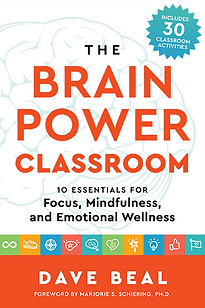
Why We Do It
The Importance of Self-Care
We become...
Teachers, coaches, social workers, psychologists, therapists, administrators and parents because we love children and we want to empower them to create a better tomorrow.
However, working with children – as hugely rewarding and life affirming as it can be – can also be tremendously stressful. Without a system of proactive tools to manage our stress, it is very easy to lose our drive and compromise our health.


Oxygen Mask Principle
Whenever you fly, you are reminded of the importance of self-leadership. The flight attendant asks passengers to “Make sure to put on your mask first before assisting others.”
This “Oxygen Mask Principle” applies to educators as well.
Source: Giphy.com
When we are physically healthy, energized, happy, passionate, creative, focused and confident we are simply better at what we do.
All the research-based brain exercises we teach are proven to not only improve student health and achievement –
They work for us, too!
By engaging in everyday classroom routines that include simple mind-body exercises such as breathing, meditation and stress management techniques, we are able to bring a powerful dose of wellness into our lives and the lives of our students.

Control vs. Collaboration
The Latin root for education means, "To draw out"


When we create a collaborative environment between students and teacher, we inspire students to take an active role in their education which leads to independent thinking, compassionate leadership, creative problem solving and much more!

Classroom Relationships
Positive atmospheres and positive relationships are interdependent. In a Brain Power Classroom, students and teachers work together to create three positive types of relationships on a daily basis.

Positive Discipline
Our workshops empower educators with many positive discipline classroom strategies. Here are a few of the strategies that are more deeply elaborated on in our workshop training materials and in the Brain Power Classroom book:
3 to 1 Principle
Catch your students “being good” three times more often than criticizing negative behavior or performance. Specific, character-based praise that celebrates effort and attitude encourages positive resiliency and maximum effort.
Proximity & Space
When a student is off task or disruptive, simply walking towards them, making eye contact from across the room, using their name in a sentence or gently touching their shoulder can help them redirect their behavior.
If you're in the middle of addressing the class, don't break your focus by explicitly pointing out the student’s negative behavior. That not only embarrasses the students (which invites resentment and revenge) but also shows the rest of the class that the best way to get your attention is to misbehave. Deal with negative behavior with a one on one conversation that respects the student and invites cooperation.
Eye Contact on Their Level
Whenever you need to speak with a student about inappropriate behavior, make sure to physically lower your posture so that you are on “their level.” You may be surprised at how this simple positional adjustment changes not only what you say but how you say it. Eye level talk helps us shift from a blame-orientation to a problem solving orientation.
Teach Empathy, Intrapersonal Awareness &
Problem Solving
Whenever possible, ask students to reflect on how their actions made their peers feel. Also, ask them how they felt when they behaved in a negative manner. This helps them find and trust their inner sense of morality. When you ask them questions, it invites them to see the situation differently and to take ownership of what they should do to fix it.
Empathy → “How do you think she felt when you said that?”
Intrapersonal Awareness → “How did it feel in your heart when you said that?”
Problem Solving → “What can we do to make it right?”
The Big Picture
Brain Power Wellness believes it’s important for all of us to have a big, beautiful dream that gives our life a vibrant purpose and keeps us motivated and inspired...
To this end, the purpose of all our training is to not only empower our students to achieve academic success and social emotional health, but ultimately for all of us to utilize these tools to become responsible and proactive citizens of our global community.
We are proud to partner with many CBOs doing great work to share health and happiness in NYC and beyond.
We are proud of our hundreds of Brain Power Student Leaders and the Brain Power Trainers and Leaders who mentor them for creating meaningful and inspiring Earth Citizen Dream Projects which benefit their schools’ communities and the Earth as a whole.
Here is a link to a non-profit that is doing amazing work to share mindfulness and sustainability on a global scale:




